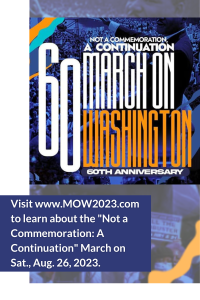By guest blogger Jennifer DeLeon, ELCA Director for Racial Justice [more]
As we commemorate the 60th anniversary of the historic March on Washington for Jobs and Freedom in 1963, the resounding importance of that pivotal event echoes powerfully into the present day. The factors that propelled the March, including ending racial segregation, fighting for economic justice and securing voting rights, remain as urgent and relevant as ever.
 The struggles of the past continue to surface in challenges of the present. The legacy of segregation persists, reminding us that the fight for equality is far from over. The enduring outcome of redlining, a systemic practice that denies access to loans, insurance and other financial benefits to residents of mostly BIPOC communities, continues to fragment our society along racial lines.
The struggles of the past continue to surface in challenges of the present. The legacy of segregation persists, reminding us that the fight for equality is far from over. The enduring outcome of redlining, a systemic practice that denies access to loans, insurance and other financial benefits to residents of mostly BIPOC communities, continues to fragment our society along racial lines.
In addition, although the passing of the Voting Rights Act in 1965 represented progress, we find ourselves confronted with a disconcerting reality: a surge of legislative efforts aimed at curtailing voting rights that disproportionately affect BIPOC communities continuing to uphold racial divisions. According to the League of Women Voters, “In 2023, at least 322 bills restricting voting access were introduced in state legislatures nationwide.” This alarming trend underscores the need to draw a direct line from the struggles of the past to the challenges of the present, emphasizing the crucial importance of understanding history and rallying against injustice to ensure a more equitable future for all.
 In our church, we continue to work towards living out the commitments we made in 1993 when we passed our social statement, Freed in Christ: Race, Ethnicity, and Culture. “The Church that confesses Christ in public demonstrates its commitment through involvement in public life—globally and locally, nationally and in neighborhoods,” it reads (p. 6). It continues: “This church will support legislation, ordinances, and resolutions that guarantee to all persons equally: civil rights, including full protection of the law and redress under the law of discriminatory practices; and to all citizens, the right to vote” (p. 7)
In our church, we continue to work towards living out the commitments we made in 1993 when we passed our social statement, Freed in Christ: Race, Ethnicity, and Culture. “The Church that confesses Christ in public demonstrates its commitment through involvement in public life—globally and locally, nationally and in neighborhoods,” it reads (p. 6). It continues: “This church will support legislation, ordinances, and resolutions that guarantee to all persons equally: civil rights, including full protection of the law and redress under the law of discriminatory practices; and to all citizens, the right to vote” (p. 7)
In recent years, we have supported and will continue to advocate for the passage of the John R. Lewis Voting Rights Advancement Act of 2021 and other similar legislation. As we commemorate this historic day, we invite you to join our advocacy network and work towards making the dreams expressed in the March a reality.
Learn more about ELCA Racial Justice Ministries at ELCA.org/racialjustice
